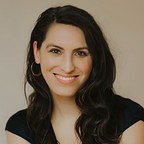Singing myself home: How motherhood and a growth mindset brought me back to my voice
I couldn’t have predicted that bedtime songs with my infant son would be the thing that drew me back to classical music.
I had earned a bachelor’s degree in Voice from the Jacobs School of Music at Indiana University and then sang very little in the decade following. Instead, I pursued a career in public education. Now in my mid-30s, I’ve returned to classical music study over the past year.
I gave birth to my son in 2020 and in the quiet, uncertain nights of the pandemic lockdown, I began singing songs to him each night. Singing in this way gave me a way to bond with my son, reignited my love for singing, and gave me a reason to use my voice regularly. When my son was 2, my family moved cross-country and I found myself both with more time and a physical ability to use my voice again– something I’d lost in the vocal and physical demands of classroom teaching. I began to explore and learn music I connected with, songs that spoke to me or reflected my life.
I prepared for and performed my first solo recital since college in the spring of 2023 (a move I now recognize as bold as I hadn’t taken any lessons in many years). I felt liberated. I chose music that I loved and identified with and the freedom of managing this for myself renewed my love for discovering myself through song. After my recital, I returned to voice lessons. I began to appreciate my voice, and I realized that it wasn’t just my shifted life circumstances that had allowed me to embrace singing; it was the confluence of major shifts within myself:
- Vocal maturity. This one is simple: now in my mid-30s, I have access to a richer and more resonant sound than I had ever experienced in my early 20s.
- A growth mindset. In my work as a teacher of children, I taught my students about Carol Dweck’s research and the value of a growth mindset: learning new skills takes time and intentional practice, and change is possible! It seems so obvious to me now, but it took me years to internalize this for myself, especially regarding vocal training. In college, I was an immature singer in a top music school, and I never felt I could compete with the talent around me. Now, I embrace that singing is not really about competition with others, but developing your own best instrument and seeing what possibilities open. The experience of navigating challenging situations as a public school educator certainly helped me build the mindset that improvement comes through experience, reflection, and intentional planning.
- The ability to coach myself. I was working as an instructional coach of teachers in the early stages of my return to singing, and my own professional practices of celebrating progress, setting micro-goals, and even creating norms within team spaces (in my case, for myself in my own rehearsal space) spur my progress and my attitude about my progress. Vocal setbacks or progress I’ve yet to make no longer discourages me in the way it used to. And while I stepped away from voice lessons for many years, having a teacher and coach now to provide regular feedback is invaluable to me, and a reminder that outside perspectives are essential.
Now, I embrace singing as a vessel for self-love, an opportunity for creative expression, and a challenge. As a mother invested in giving my child interesting and new experiences, singing gives me my own daily interesting opportunity and novel experience. I‘m here for the thrill.
